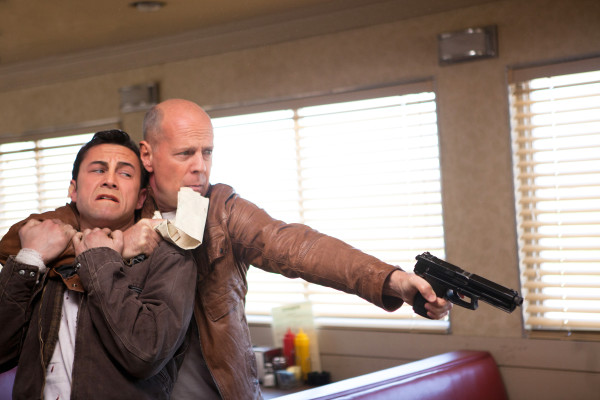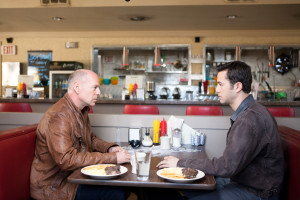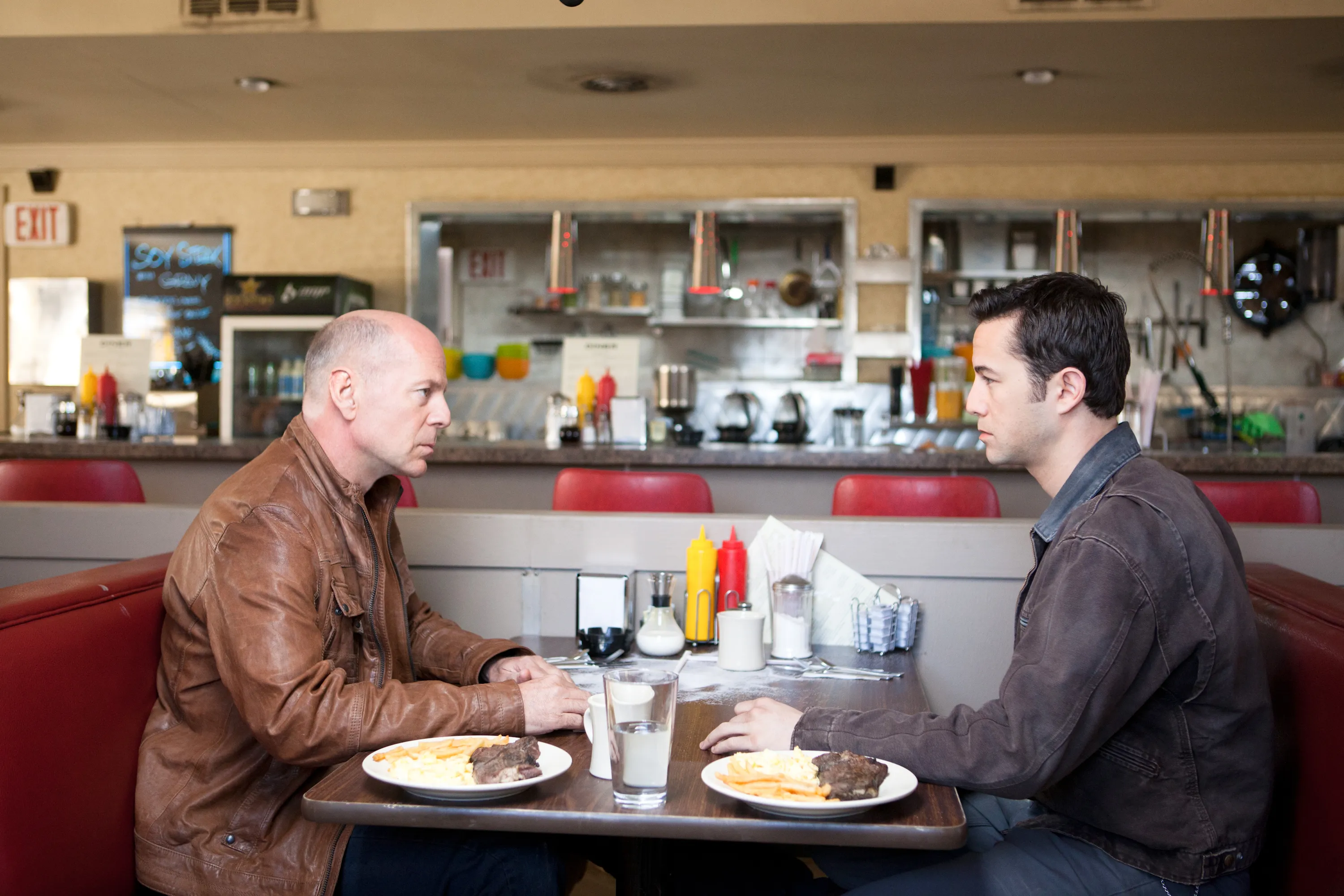
From what might certainly be one of the best-spliced trailers of 2012/the summer/all time, moviegoers might expect from director Rian Johnson’s latest, “Looper,” a mind-bending, time-traveling bounty hunt wherein a Bruce Willis version of a main character aims to kill a Joseph Gordon-Levitt version of said main character (or vice versa?). Mix in some Emily Blunt, Jeff Daniels, club scenes and dub-step, and the stage of cinematic expectations has been set.
Indeed, the viewer would expect the action slash sci-fi slash existential mindfuck that the “Looper” trailer would imply, and she would happily see what presents itself as a quality but stock film we could contently stack near our “Bourne,” “Inception” and “Drive” DVDs.
But just as with a disappearing act, we watch it anyway, for the sake of the illusion, for the craftsmanship. And it’s because we know what we can expect that we find ourselves delightfully unsettled by the routine the magician suspends before us. In the case of “Looper,” Rian Johnson has managed to wave the cloth of magical time travel over genre-bending sci-fi fixtures to produce a maturely novel version of a story old as Eden.
In the nearish future of 2044 (just around this writer’s 30th Stanford reunion), a young Joe (Gordon-Levitt) stacks his silver by killing future bodies thrown back in time by the mob. There’s not much hunting; thanks to the time-transcending technology, Joe spends the assassination portion of his Looper life pointing a never-failing blunderbuss at his marks like a kid knocking off bull’s-eyed ducks at the county fair. With a Bazooka. Little more than fish in a barrel until events conspire to place old Joe (Willis) before young Joe’s blunderbuss, and the hunt is set into motion.

The film’s unexpected plot—rightfully unspoiled by that trailer and this writer—lays it on thick, and the neat yet complex story wraps itself in a surprisingly uplifting package. Gordon-Levitt, that chameleon boy-wonder, slips into Joe, a morally ambiguous but ultimately likable anti-hero, in a way that has us wondering if our beloved JGL was in the film at all—and not just because he looks strikingly like Bruce Willis.
Johnson credits Gordon-Levitt’s eerily apt performance of a young Old Joe to his mimetic study of an older Willis, using “Sin City” rather than the first “Die Hard.” Guarding himself from the audience like his character from his pursuers, Bruce Willis strikes his balance between dramatist and action star. The result is two Joes, the same character(s) separated by time and life experiences, who play different because they are, even if they aren’t.

Emily Blunt, one of three women—all strong, independent and more or less disposable—gives an adequate but forgettable performance, which speaks more to the film’s story than to Blunt’s ability. Blunt’s Sarah echoes Johnson’s writing, which draws women faithful to their form but confined to a singular angle. The women, all unequivocally good, stand starkly against the men, who as Gordon-Levitt describes are neither good nor bad. Indeed, the viewer relishes that queasy uncertainty of who we ought root for.
Johnson’s treatment of action thankfully mirrors that of time travel; “Looper” is “a movie that uses time travel, but it’s not about time travel,” Johnson says. What creeps into the critical mind for movies like “Shutter Island,” “The Dark Knight Rises” and even the anointed “Inception”—the need for an explanation of technical details we know are not real or possible or sanely reasonable but distract and frustrate us anyway—flutter away in the case of “Looper.” Johnson’s “Looper,” he claims, has a rule that a vigilant viewer could construct despite the deliberate lack of a chalkboard scene that explains the mechanics of time travel. But we don’t care. We willingly suspend our disbelief to accept the magic of “Looper” because we want to be fooled, just this once. And it is perhaps the ambiguity, the impossibility of the space-time continuum that imbues a sense of faith into…no spoilers!
But even with great acting, a fresh story and some stunning visuals, the real prestige of Johnson’s magical display is the deftness with which he gets around somewhat tired themes in a carousel of genres each taking the stage, passing through the projector’s light without drawing attention way from those other dazzling pieces. As in “Brick” and “The Brothers Bloom,” archetypal genres mix together in a smooth pastiche of film noir, spaghetti Western, sci-fi and mob movie in such a way that has us wondering not why it hasn’t been done before—it has—but why these genres aren’t all the same anyway.
And in that way each genre complements the next, airs out their differences and injects life into what very well may have been an uninspiring script under the thumb of any other director.
At the heart of “Looper” is a philosophical question cheapened by ambitious blockbusters and belabored by effete art films. Instantly appealing and unrelenting in its ability to conjure genuine contemplation, introspection and—gasp!—moral consideration, “Looper” will win our thumbs up and settle in to our deep places of film favorites.
Young Sasha is a current junior but wrestles with her old self over the merits of CS versus journalism classes.
